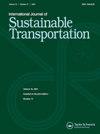Bus regulation and the net-zero transition dynamics in Great Britain
IF 3.9
3区 工程技术
Q2 ENVIRONMENTAL STUDIES
International Journal of Sustainable Transportation
Pub Date : 2025-10-03
DOI:10.1080/15568318.2025.2524475
引用次数: 0
Abstract
The transition to urban Net-Zero emission bus (ZEB) transportation receives policy attention throughout the world. Most studies in this area address techno-economic aspects, overlooking the role of institutional workings. This offers limited insight into actual transition problem areas and solutions. Informed by expert interviews, this article examines the ways in which two bus institutional environments – deregulation and franchising – shape financial and organizational challenges and opportunities for the ZEB transition in Great Britain (GB). The analysis suggests that it is the larger local authorities and bus operators in deregulated networks that tap into central government funding. Yet, the ad-hoc and competitive nature of these programs restricts longer-term strategic planning, whereas less competent authorities and operators are left behind. In the franchise model (London case), higher contract prices for ZEB tendered routes facilitate investments. However, operators must address the substantial upfront costs of ZEB vehicles and infrastructure. Concurrently, wider conditions including declining bus patronage and high car use in urban areas pose financial risks in both networks. Organizationally, the public oversight of franchised networks drives ZEB adoption, while a culture of collaboration that draws upon distinct stakeholder competences appears central, particularly in deregulated networks. The article highlights the importance of public management of bus networks based on local stakeholders’ transition priorities. It concludes with policy recommendations for accelerating ZEB transitions.
英国公共汽车法规与净零排放转型动态
向城市净零排放公交(ZEB)交通过渡受到世界各国政策的关注。这一领域的大多数研究都涉及技术经济方面,而忽视了体制运作的作用。这对实际的转换问题领域和解决方案提供了有限的见解。通过专家访谈,本文考察了两种公共汽车制度环境——放松管制和特许经营——如何塑造英国(GB) ZEB转型的财务和组织挑战与机遇。分析表明,在放松管制的网络中,较大的地方政府和公交运营商利用了中央政府的资金。然而,这些项目的临时性和竞争性限制了长期战略规划,而能力较弱的当局和运营商则被抛在后面。在特许经营模式(伦敦案例)中,ZEB投标路线的合同价格较高,有利于投资。然而,运营商必须解决ZEB车辆和基础设施的大量前期成本问题。与此同时,更广泛的情况,包括公交车乘客减少和城市地区汽车使用率高,给这两个网络带来了财务风险。在组织上,对特许经营网络的公众监督推动了ZEB的采用,而利用不同利益相关者能力的合作文化似乎是核心,特别是在放松管制的网络中。本文强调了基于地方利益相关者的过渡优先事项对公交网络进行公共管理的重要性。报告最后提出了加速ZEB转型的政策建议。
本文章由计算机程序翻译,如有差异,请以英文原文为准。
求助全文
约1分钟内获得全文
求助全文
来源期刊
CiteScore
8.90
自引率
2.60%
发文量
56
期刊介绍:
The International Journal of Sustainable Transportation provides a discussion forum for the exchange of new and innovative ideas on sustainable transportation research in the context of environmental, economical, social, and engineering aspects, as well as current and future interactions of transportation systems and other urban subsystems. The scope includes the examination of overall sustainability of any transportation system, including its infrastructure, vehicle, operation, and maintenance; the integration of social science disciplines, engineering, and information technology with transportation; the understanding of the comparative aspects of different transportation systems from a global perspective; qualitative and quantitative transportation studies; and case studies, surveys, and expository papers in an international or local context. Equal emphasis is placed on the problems of sustainable transportation that are associated with passenger and freight transportation modes in both industrialized and non-industrialized areas. All submitted manuscripts are subject to initial evaluation by the Editors and, if found suitable for further consideration, to peer review by independent, anonymous expert reviewers. All peer review is single-blind. Submissions are made online via ScholarOne Manuscripts.

 求助内容:
求助内容: 应助结果提醒方式:
应助结果提醒方式:


